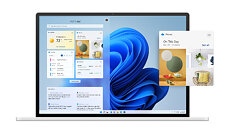- Joined
- Aug 19, 2017
- Messages
- 3,248 (1.12/day)
Yesterday, we reported the launch of Microsoft's next-generation Windows 11 operating system. Featuring a broad range of improvements that include the new and redesigned UI elements, 40% smaller updates, layouts, widgets, and a bunch of other stuff, existing Windows 10 users are wondering how and when they will be able to experience the new OS. The OS is coming later this year, with some preview beta builds supposed to arrive in the coming weeks. That means that a large portion of people is interested in trying out even the beta version. However, there is an important note about the new OS. When it officially comes out, all of the existing Windows 10 users can upgrade to Windows 11 for free, by just performing the software update.
To run the new OS, Microsoft lists a few new requirements like 4 GB of RAM, 64 GB of storage, 1+ GHz dual-core processor, and Trusted Platform Module (TPM) 2.0. The TPM 2.0 needs to be physically present, however, it is often turned off in BIOS, so future users need to enable it in BIOS as well. For more details, please head over to Microsoft website to find greater details on the upgrade.

View at TechPowerUp Main Site
To run the new OS, Microsoft lists a few new requirements like 4 GB of RAM, 64 GB of storage, 1+ GHz dual-core processor, and Trusted Platform Module (TPM) 2.0. The TPM 2.0 needs to be physically present, however, it is often turned off in BIOS, so future users need to enable it in BIOS as well. For more details, please head over to Microsoft website to find greater details on the upgrade.

View at TechPowerUp Main Site









